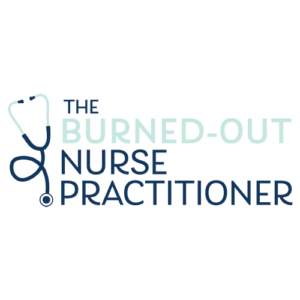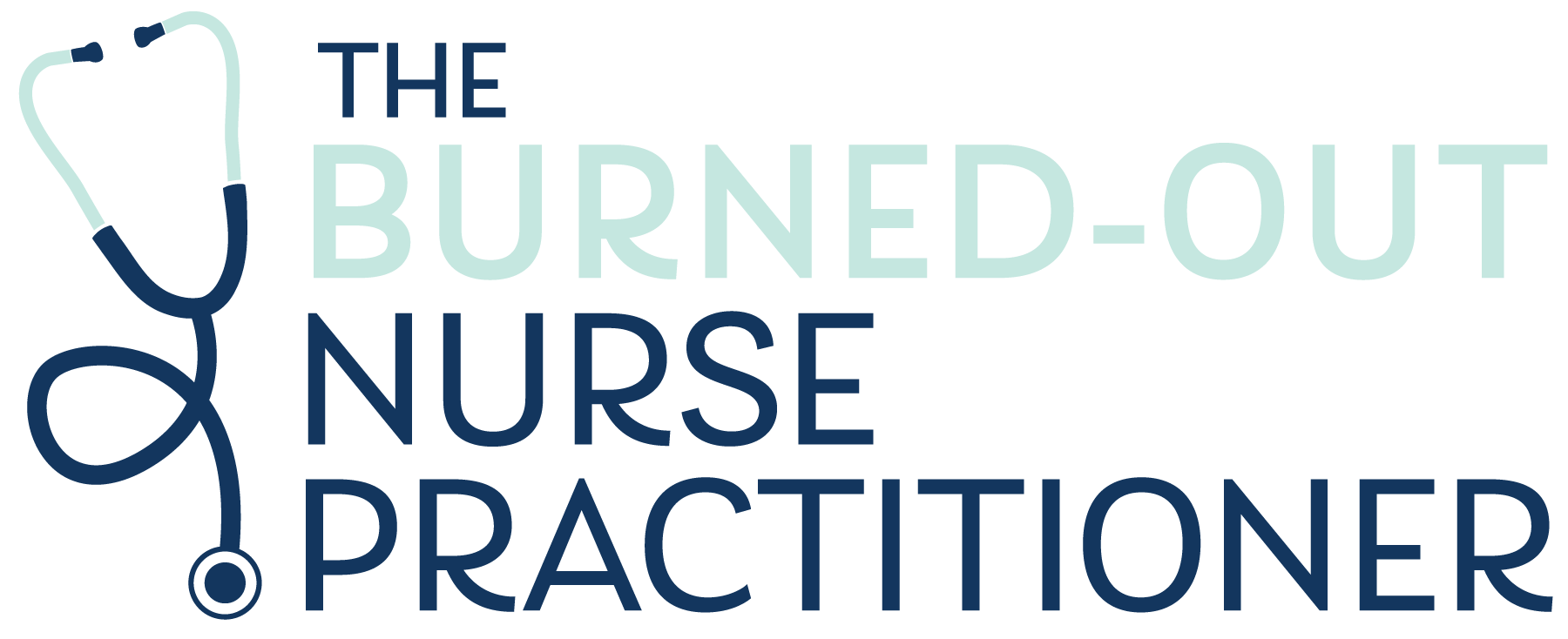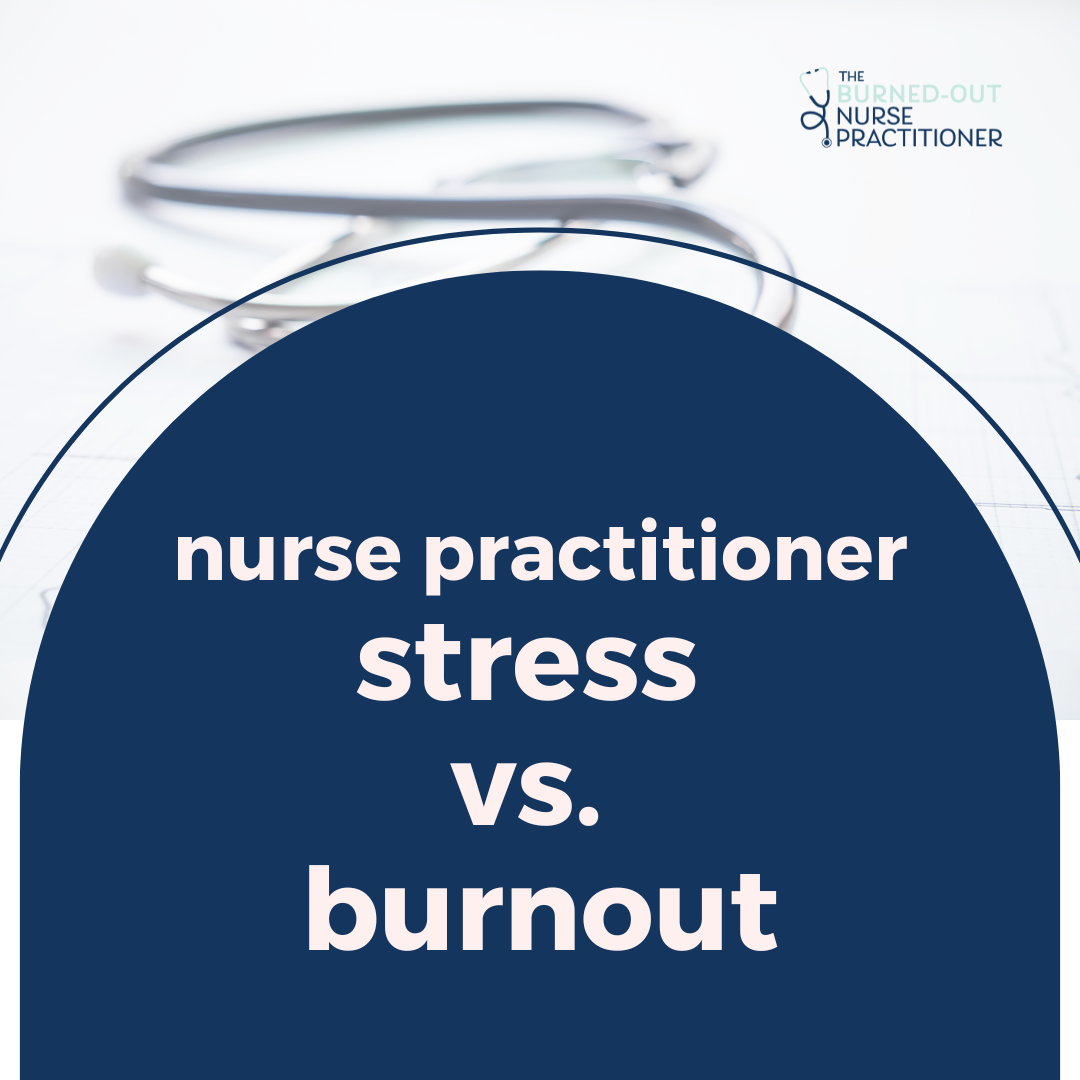There is a difference between nurse practitioner stress vs. burnout.
Nurse practitioners are used to stress. Whether an APRN works in a busy emergency room setting or an overwhelming primary care clinic, there is constant stress. The demands of a nurse practitioner are never-ending. Add on a global pandemic that changed the world and a shifting healthcare system.
Many nurse practitioners’ stressful days consist of patients who are scheduled for 10-15 minute appointments (and sometimes double booked on top of that). Not only do nurse practitioners partake in assessing, diagnosing, and treating patients, APRNs also have to document findings for billing & coding and legal purposes . Then add on medication refills, analyze diagnostic data, review past medical records, and the never-ending patient messages. These other tasks greatly impact nurse practitioner stress.
Nurse practitioners in the hospital setting also experience stress through tightening insurance regulations and trying to function while short-staffed in nearly every department.
The pressure on nurse practitioners has exponentially increased. While stress is a normal concept to APRNs, there is also an increase in nurse practitioner burnout. We will take a look at the differences between stress and burnout, how these concepts are present for nurse practitioners, and how to overcome them.
Differences between nurse practitioner stress vs. burnout:
- Length of time. Stress can usually has a set end time (i.e. after a shift, after leaving a job, after completion of a project, etc.). Where burnout continuously compounds and does not have a definite end (until the NP completes the steps to resolve nurse practitioner burnout ) .
- Recovery time. With nurse practitioner stress, APRNs can more easily overcome in a few hours or days. A good exercise, time off to recharge, or vacation can help improve stress (see other tips for managing stress below). But with burnout, it may take weeks to months to recover and requires a multifactorial approach.
- Feelings related to stress. With stress, the nurse practitioner often experiences an over-engagement or overwhelm. The tasks at hand often consume the NPs mind and actions. With burnout, many healthcare providers become disengaged and detached. They no longer experience compassion and seem to feel numb.
- Level of energy. With stress, many nurse practitioners have an increase in energy and motivation. They may feel overwhelmed but are generally focused to get the task done. But with burnout, many nurse practitioners struggle with concentration and motivation to do their work. APRNs struggle with their energy level and often become disengaged.
- Creation of exhaustion. Nurse practitioner stress can cause short-term mental, physical, and emotional exhaustion. But with burnout, this exhaustion is prolonged and can lead to psychological or identify changes.
How nurse practitioner stress vs. burnout presents.
- Presentation of Stress. Stress can look like seeing 30+ patients a day. Constantly behind on charting. Trying to manage medication refills, analyzing diagnostic data, reviewing medical documentation, and the never-ending patient messages. Stress in nurse practitioners presents as overwhelm and pressure to get tasks accomplished. Stress generally involves an increase in our sympathetic nervous systems which can help nurse practitioners be more alert and motivated to get the work done. Prolonged or chronic stress can lead to nurse practitioner burnout.
- Presentation of Burnout. Burnout looks like completing the above-mentioned tasks a nurse practitioner does, but becoming disassociated. If seeing your favorite patient or type of patient used to bring you joy, it can look like no longer finding fulfillment in this. Many nurse practitioners struggle with being emotionally and mentally absent. They struggle with compassion fatigue and empathy. When I was burned-out, I struggled with being detached from my work as an RN, my family/friends, and even detached from myself. I no longer enjoyed the activities or work I used to love. Burnout presents as feeling numb and disengaged in life.
How to overcome nurse practitioners stress vs. burnout.
Overcoming nurse practitioner stress and nurse practitioner burnout can be accomplished with similar strategies. However, as previously mentioned, conquering the stress can occur after a couple stress management techniques. Resolving nurse practitioner burnout requires an increased length of time and completing multiple techniques.
- Self-care tactics. As The Burned-out Nurse Practitioner, I stress the importance of completing self-care. APRNs can come up with many excuses such as, “I am too tired after a busy work day” or “ I don’t have time for self-care. ” But completing the activities that continuously fill our cup helps us to resolve nurse practitioner burnout. While diet, exercise, and sleep are important, I prefer nurse practitioners to choose the activities that actually bring them joy. If going out to eat with a group of friends makes you happy, then do it. If sitting home binging on Netflix helps you to rest, then do it. It is so important to prioritize time for ourselves and allow ourselves time to recharge.
- Quitting the J.O.B. that is burning you out. While quitting the nurse practitioner job that is causing your burnout can help, it is not the first step I recommend. For starters, many nurse practitioners are the breadwinners for their families or need the NP job for the benefits (i.e. health insurance, retirement, etc.). Secondly, just because a nurse practitioner quits their job doesn’t mean the NP burnout will resolve. The feelings of burnout could follow that APRN to the next job and show up in similar ways. Some causes of nurse practitioner burnout are out of our control (i.e. toxic-work environment , changes in healthcare, increase contact from employer , etc.). But nurse practitioners need to address the underlying issues that they can control (i.e. lack of self care , unhealed trauma , lack of contentment or gratitude , etc.) and actually resolve the burnout.
- Improve work-life balance. There are many different causes of a poor work-life balance for nurse practitioners. The number one cause I have found through my work as The Burned-out Nurse Practitioner is CHARTING! So many nurse practitioners stay late at the office or bring charts home. This takes time and energy away from their families and creates a work-life imbalance. (Click to learn more about time management and charting tips so you can STOP charting at home). Maybe your work-life imbalance is caused by a lack of boundaries . Rather than sacrificing your own time, work on setting healthy boundaries in your professional AND personal life (more info on boundary setting in Burnout Resolution for Nurse Practitioners ). Maybe you need to stop being a people pleaser and focus more on what makes you happy.
There are many ways to overcome nurse practitioner stress and overcome nurse practitioner burnout. Make sure to check out The Burned-out NP’s blog page for other tips!
There are several differences between nurse practitioner stress vs. burnout and multiple ways NPs can overcome both. Remember stress is short-lived. Nurse practitioner stress can be managed with the above tactics. However, when stress starts to become prolonged or chronic, it can cause burnout.
Nurse practitioners do not become burned out overnight and it can not be resolved overnight. Burnout can take weeks even months to overcome. Nurse practitioners may need to seek help for overcoming burnout. It can be a long journey and burned-out NPs need support from The Burned-out Nurse Practitioner Facebook group. The nurse practitioner may need to seek additional information and resources for overcoming NP burnout. Be sure to check out Burnout Resolution for Nurse Practitioners.

For time management and charting tips, check out The Nurse Practitioner Charting School– The one stop for all documentation resources created specifically for nurse practitioners. Learn more at www.npchartingschool.com

**Full disclosure, this blog post may include affiliate links. I do receive a commission if any of the affiliate programs/services/supplies are purchased. This is at no extra cost to you but does allow me to continue to provide content as The Burned-out Nurse Practitioner! Thank you!





